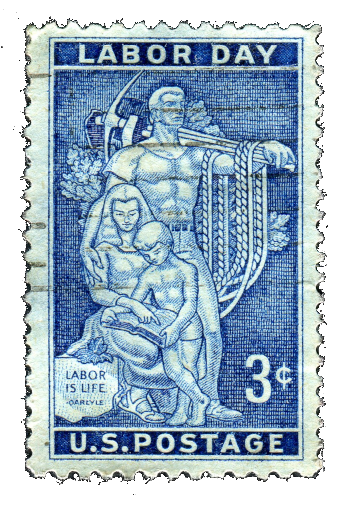Work
September 4, 2023

Today, September 4, 2023, is
Labor Day in the
United States. This
holiday in
honor of the
American worker is observed on the first Monday in September, making this a three day holiday when combined with the Saturday and Sunday of the
weekend.
Congress passed an act on June 28, 1894, making Labor Day a
legal holiday.[1] However, prior to that time, many
U.S. states had recognized a Labor Day holiday, the first Labor Day holiday being celebrated on Tuesday, September 5, 1882, in
New York City.[1]
The present day
mantra for Labor Day might be
Rihanna's Work in which the
word,
work, is often repeated.[2].
(1956 United States postage stamp in honor of Labor Day, issued on September 3, 1956. Wikimedia Commons image by Karen Horton.)
The
conflict between
employers and employees and its concurrent
income inequality is recently framed in the
concept of the
one-percenters. Income inequality has been with us since before
medieval fiefdoms, but it
flourished during the
Industrial Revolution. A
dramatization of this in the early
20th century is the 1927
silent film,
Metropolis,
directed by
Fritz Lang (1890-1976).[3-4] This film, one of the first
science fiction films, just entered the
public domain in the United States; but, to illustrate the flawed state of
copyright law, it's still under copyright in the
European Union until 2046. This 120 term limit for copyright seems excessive to all except
politicians.
One other
theme of Metropolis is that man has been
subjugated by his
technology (see
video clip), something many of us feel when being besieged by
email messages and
text messages long after
working hours.
Video Downloads
•
MP4 video file (Metropolis_01.mp4, 5.1 MB)
• WebM video file (Metropolis_01.webm, 0.75 MB)
• MOV Video file (Metropolis_01.mov, 4.5 MB)
As intuitively observed by any
child pulling a
sibling on a
wagon or
snow sled,
work is related to the pulling
force needed and how far you need to travel.
French philosopher,
René Descartes (1596-1650), realized this when he
wrote in an October, 5, 1637,
letter to
Dutch physicist,
Christiaan Huygens (1629-1695), "Lifting 100
lb one
foot twice over is the same as lifting 200 lb one foot, or 100 lb two feet."
German polymath,
Gottfried Leibniz (1646-1716), concurred in 1686 by writing that "The same
work is necessary to raise body A of 1
pound to a
height of 4
yards, as is necessary to raise body B of 4 pounds to a height of 1 yard."
Work W is defined in physics as the
scalar product of a force
F acting over a
distance L. Since it's a scalar product of
vectors, if the
direction of force and distance are not
aligned, we need to
multiply by the
cosine of the
angle θ between their directions; viz.,
W = F·L cos(θ). The
newton is the unit of force, making the unit of work to be a newton-
meter. The
SI unit of work, the
joule, is also the same unit for
energy.
There's a connection between work and energy, as seen in their having the same units. Energy is work done over
time. Net positive work increases the
kinetic energy of a
particle, while net negative work will cause a decrease; and, the longer the work is applied, the greater the energy change. The applied work is equal to the change in energy,
W = ΔEk
In the late
18th century,
Scottish engineer,
James Watt (1736-1819),
quantified work as it's expended over time. Today's unit for this quantity,
power, is the newton-meter/
second, which is called a
watt in his honor. In Watt's time,
horses were a primary source of power for many things; so, Watt's unit of power was the
horsepower, the power needed to lift the weight of a
man (75
kilograms) to one meter in one second (see figure). In today's units, a
metric horsepower is about 735.5 watts.

Illustration of the metric horsepower as the power needed to lift 75 kilograms one meter in one second. Automobile manufacturers delight in using horsepower as a measure of their engine performance. (Modified Wikimedia Commons image by Sgbeer. Click for larger image.)
As we celebrate Labor Day, foremost in our minds should be the workers who do
real work; namely all the
tradesmen,
construction workers,
service workers, and so on. On a second
tier are all those who
sit comfortably at a
computer terminal all day in a
climate controlled office; and, yes, that includes me. How much work is actually done by pushing keys on a
computer keyboard?
Estimates of the force and
stroke needed to enter a
character on a keyboard can be found on the
Internet,[5] and this gives the work needed to enter a keyboard character. Combine this with an average
typing speed (characters per minute, cpm, and characters per second, cps) gives an estimate of the power expended in continual typing, as shown in the following table.
Keyboard Keypress Power
| Quantity |
Value |
Units |
| Force |
5.5 |
N |
| Stroke |
2.0 |
mm |
| Stroke |
0.002 |
m |
| Rate |
225 |
cpm |
| Rate |
3.750 |
cps |
| Duration |
0.267 |
seconds |
| Power |
0.041 |
watt |
Since the
basal metabolism of a
human is about 60-75 watts, we see that keyboard entry is roughly equivalent to being a
couch potato.
References:
- History of Labor Day, U.S. Department of Labor Web Site.
- Rihanna, "Work, ft. Drake (Explicit Lyrics), Vevo Video on YouTube, February 22, 2016, also found at Rihanna, "Work, ft. Drake (Lyrics), YouTube Video by Lily Torres Reyes, February 24, 2016.
- Metropolis (1927, Fritz Lang, Director) on the Internet Movie Database.
- Metropolis (1927, Fritz Lang, Director), YouTube Video by All Time Classics, Aug 31, 2022.
- Das Keyboard Blog.
Linked Keywords: Labor Day; United States; holiday; honor; America; American; workforce; worker; weekend; Act of Congress; public holiday; legal holiday; U.S. state; New York City; mantra; Rihanna; word; work (human activity); postage stamp; Wikimedia Commons; Karen Horton; social conflict; employers and employees; income inequality metrics; income inequality; concept; one-percenters; Middle Ages; medieval; fief; fiefdom; flourished; Industrial Revolution; drama; dramatization; 20th century; silent film; Metropolis (1927 film); film director; Fritz Lang (1890-1976); science fiction film; public domain; copyright law; European Union; politician; theme (narrative); slavery; subjugated; technology; video clip; email message; text message; working time; working hours; intuition; intuitive; child; force; pulling; sibling; toy wagon; snow sled; work (physics); France; French; philosopher; René Descartes (1596-1650); writing; wrote; letter (message); Netherlands; Dutch; physicist; Christiaan Huygens (1629-1695); pound (mass); lb; foot (unit); Germany; German; polymath; Gottfried Leibniz (1646-1716); height; yards; work (physics); dot product; scalar product; distance; Euclidean vector; direction vector; align; multiplication; multiply; trigonometric function cosine; angle; newton (unit); meter; International System of Units; SI unit; joule; energy; time; kinetic energy; particle; 18th century; Scotland; Scottish; engineer; James Watt (1736-1819); quantification; quantified; power (physics); second; watt; horse; horsepower; man; kilogram; metric horsepower; automobile; manufacturing; manufacturer; internal combustion engine; performance; tradesman; construction worker; service industry; service worker; ranking; tier; comfort; sit comfortably; computer terminal; heating, ventilation, and air conditioning; climate control; office; computer keyboard; approximation; estimate; movement; stroke; alphabet character; Internet; words per minute; typing speed; basal metabolic rate; basal metabolism; human; sedentary lifestyle; couch potato.